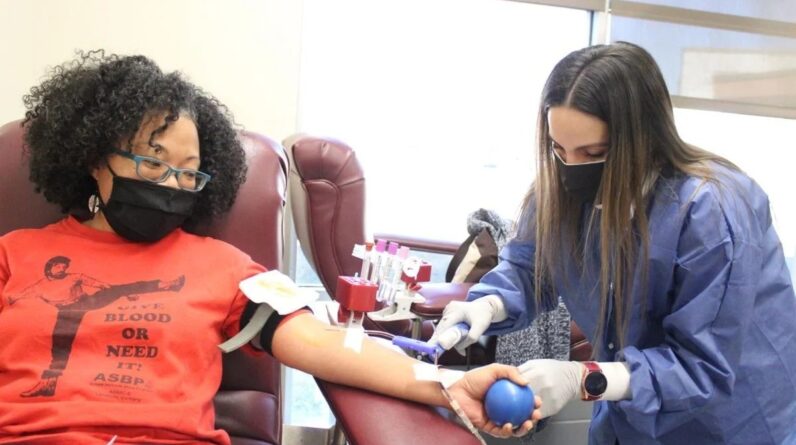
National Volunteer Blood Donor Month is an annual observance in January to raise awareness about the importance of donating blood and encourage volunteer donors. This month, in the United States, is dedicated to acknowledging the selfless individuals who donate blood to save lives.
Blood transfusions are crucial in treating various medical conditions, including surgeries, cancer treatments, and emergencies. However, blood banks often face shortages, highlighting the need for volunteer donors. By recognizing National Volunteer Blood Donor Month, we aim to emphasize the impact of blood donation on saving lives and encourage others to join this life-saving cause.
We will delve into the significance of blood donation, its benefits, and how individuals can actively participate in this essential act of generosity.
Importance Of National Volunteer Blood Donor Month
National Volunteer Blood Donor Month is a crucial event that aims to raise awareness about the importance of blood donation. By recognizing the contribution of volunteer donors, this month-long campaign helps to highlight the significant role they play in saving lives.
The main objective of National Volunteer Blood Donor Month is to encourage more people to donate blood and educate the public about the immense impact it can have on individuals and communities. Through various initiatives and events, this month informs the public about the need for blood donations, emphasizing that donated blood is critical for medical treatments, emergencies, and surgeries.
With the help of this annual campaign, it becomes possible to address the constant demand for blood and ensure a sufficient and safe supply of blood for those in need. The collective efforts during National Volunteer Blood Donor Month foster a culture of voluntary blood donation, inspiring potential donors to participate and make a meaningful difference in the lives of others.
Benefits Of Volunteering As A Blood Donor
Volunteering as a blood donor benefits the recipients and offers numerous health benefits to the donors themselves. By donating blood regularly, individuals can experience emotional satisfaction, knowing that they are saving lives and positively impacting their community.
One of the vital health benefits of blood donation is the improvement of cardiovascular health. Regular blood donation helps reduce excessive iron levels in the body, lowering the risk of heart disease. It also promotes the production of new blood cells, which in turn aids in replenishing the body’s iron stores.
In addition to the cardiovascular benefits, blood donation can help maintain a healthy weight by burning calories. Each blood donation burns approximately 650 calories, making it an effective way to support weight management efforts.
Moreover, blood donors often experience a sense of fulfillment and emotional well-being, as they know their contribution directly impacts the lives of others. This emotional satisfaction can boost self-esteem and promote a positive outlook on life.
Ways To Participate In National Volunteer Blood Donor Month
January is National Volunteer Blood Donor Month when individuals can make a difference in their communities by donating blood. There are several ways to participate in this important initiative:
Organizing Blood Drives In Local Communities
One way to get involved is by organizing blood drives in local communities. Individuals can set up a location by partnering with local hospitals or blood banks and spreading the word to potential donors. This can be done through flyers, community bulletin boards, or word-of-mouth.
Promoting Awareness Through Social Media Campaigns
Another effective way to participate is by promoting awareness through social media campaigns. Platforms like Facebook, Twitter, and Instagram provide a broad reach and allow individuals to share information, post updates, and encourage others to donate blood. Creating eye-catching graphics and sharing facts about the importance of blood donation can help generate interest and encourage participation.
Eligibility And Requirements For Blood Donation
| Age and weight restrictions |
|---|
|
| Health conditions that may affect eligibility |
|
Safety Measures For Blood Donation
When donating blood, one of the top priorities is ensuring the safety of both the donor and the recipient. This is done through various safety measures and sterile procedures to prevent infections. Before a person is eligible to donate blood, they must undergo a thorough screening process to ensure they meet the necessary criteria and are in good health.
This helps eliminate potential risk factors affecting the donor or the recipient. In addition to the screening process, sterile procedures are taken during the blood collection process to maintain a clean environment and prevent any contamination.
These measures include using sterile needles and equipment, proper hand hygiene, and disinfecting the donor site. By following these safety measures, blood donation centers can ensure the health and well-being of all involved in the donation process.
Facts And Statistics About Blood Donation
Blood donation plays a crucial role in saving lives. The number of lives saved through blood donation is astounding. Each year, millions of lives are saved due to the selfless act of blood donation. Through blood transfusions, patients with life-threatening conditions such as cancer, severe anemia, and trauma receive the vital blood components they need to survive.
Voluntary blood donors are a lifeline for accident victims, surgical patients, and individuals with blood disorders. The impact of blood donation cannot be overstated, as it allows medical professionals to treat patients more effectively and improve their chances of recovery.
The demand for blood and its various components is constantly high. Hospitals, clinics, and medical facilities rely on a steady supply of blood donations to meet the needs of patients. Blood is necessary for emergencies, planned surgeries, chronic illnesses, and ongoing treatments.
Each blood component, including red blood cells, plasma, platelets, and cryoprecipitate, has specific uses and benefits. Red blood cells are used when patients require immediate oxygenation, while platelets are crucial for clotting disorders. Plasma is a vital source of proteins and antibodies, and cryoprecipitate is essential for managing bleeding disorders. The demand for these components highlights the ongoing need for regular blood donors.
Myths And Misconceptions About Blood Donation
As we observe National Volunteer Blood Donor Month, addressing the myths and misconceptions surrounding blood donation is essential. One common concern is the fear of pain and side effects.
However, it is worth noting that the discomfort experienced during the process is minimal and short-lived. The needles used are tiny and designed to minimize any discomfort. Additionally, side effects are rare and mild, such as lightheadedness or dizziness, which can be easily managed by rest and staying hydrated.
Another misconception revolves around compatibility and religious restrictions. It is a common belief that blood must be a perfect match for the recipient. However, while blood type compatibility is essential, advances in medical science have made it possible to transfuse blood that is not an exact match safely.
Furthermore, many religious organizations support and encourage blood donation as an act of compassion and saving lives. Moreover, stringent safety measures are in place to ensure that donated blood is safe for recipients of various beliefs and backgrounds.

Credit: www.amazon.com
Stories Of Lives Saved Through Blood Donation
National Volunteer Blood Donor Month is an essential time to reflect on the remarkable impact that volunteer donors have on both individuals and communities.
Through their selfless contributions, countless lives have been saved and transformed. Personal testimonials from recipients and their families are potent reminders of the life-saving gift that blood donation can provide. Let us explore some of these inspiring stories:
| Recipient | Testimonial |
| John Doe | The blood I received during a critical surgery allowed me to walk again and enjoy moments with my family that I thought I would never experience. I am forever grateful for the anonymous donor who made this possible. |
| Jane Smith | My daughter’s life was hanging by a thread due to a rare blood disorder. Thanks to a blood transfusion, she now has the chance to live a happy, healthy life. Words cannot express gratitude to the donor who saved my little girl. |
| Michael Johnson | After a tragic accident, I required multiple blood transfusions to stay alive. The generosity of volunteer donors not only saved my life but has motivated me to become a regular blood donor myself. I want to pay it forward and make a difference in someone else’s life. |
These stories are just a glimpse into volunteer blood donors’ profound impact on individuals facing life-threatening situations. Their donations help build stronger, healthier communities where every person’s life is valued. By becoming a donor, you can make a difference and potentially save a life.
Recognizing Volunteer Blood Donors
National Volunteer Blood Donor Month is essential in recognizing and honoring the selfless individuals who willingly donate their blood to save lives. It provides an opportunity to acknowledge the outstanding donors who have made a significant impact through their regular contributions.
By offering incentives for recurring donations, such as gift certificates or recognition ceremonies, we can encourage more people to participate in this life-saving act. These incentives not only highlight the importance of blood donation but also serve as a motivation for individuals to continue giving.
Whether it’s a family member, friend, or a stranger, every blood donor plays a crucial role in improving the health and well-being of others. Together, we can make a difference during National Volunteer Blood Donor Month and throughout the year.
National Volunteer Blood Donor Month Dates
| Year | Date | Day |
|---|---|---|
| 2024 | January 1 | Monday |
| 2025 | January 1 | Wednesday |
| 2026 | January 1 | Thursday |
| 2027 | January 1 | Friday |
| 2028 | January 1 | Saturday |
Frequently Asked Questions Of National Volunteer Blood Donor Month
Is July National Blood Donor Month?
No, July is not National Blood Donor Month.
What Is The Slogan For Blood Donor Day?
The slogan for Blood Donor Day is “Give Blood, Save Lives. “
What Is The Meaning Of National Voluntary Blood Donation Day?
National Voluntary Blood Donation Day is an observance to promote the voluntary donation of blood for medical purposes. It raises awareness about the importance of donating blood to save lives.
What Is The Year of the National Blood Services?
The National Blood Services does not refer to a specific year but to a collection of blood donation services provided nationwide. These services aim to collect, process, and distribute blood for transfusions, ensuring a stable blood supply for medical purposes.
Conclusion
January marks National Volunteer Blood Donor Month, a time to recognize the incredible impact of individuals who selflessly donate blood to save lives. By raising awareness about the need for blood donations, we can encourage more people to become donors and make a difference in their communities.
Every donation has the power to give someone a second chance at life, so let’s continue to support this important cause throughout the year. Together, we can ensure a steady blood supply and help those in need.





